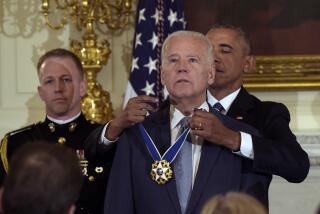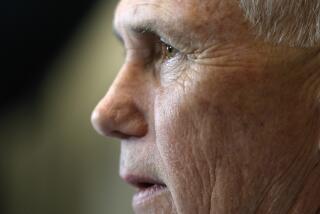Despite Big Lead in Iowa, Gore Struggles for Identity
- Share via
CEDAR RAPIDS, Iowa — It is Wednesday, 12 days before the Iowa caucuses, and Craig Wood is gung-ho on the accomplishments of what he calls “the Gore-Clinton administration.”
“Sometimes it’s referred to as the Clinton-Gore administration,” Vice President Al Gore interjects.
Never mind. The environmental programs, health care proposals and economic progress of the last seven years aren’t enough to put Wood in the Gore camp.
“I’m concerned about your ability to win,” Wood tells the vice president.
Gore had a 21-percentage-point lead here over Bill Bradley, his rival for the Democratic presidential nomination, in a recent poll of Iowa voters. Nationally, surveys find him running close behind Texas Gov. George W. Bush, the leading candidate for the Republican presidential nomination, while Bradley trails Bush by a larger margin.
But the vice president is still facing some doubts among Iowa Democrats. And for Wood, the first concern is Gore’s association with President Clinton and the political baggage resulting from Clinton’s affair with former intern Monica S. Lewinsky.
What Wood wants to hear Gore say--and his inference is clear--is, “I wouldn’t have done that.”
Gore cuts him off right there.
“I wouldn’t have done that,” he says.
For two hours and 40 minutes Wednesday, the vice president stood in a campus theater at Coe College, explaining, cajoling, exploring, listening and questioning an audience of about 160 people described by his campaign as undecided voters.
And in one of his lengthiest explications of his relationship with Clinton, the vice president said that before one judged him one must remember a few things: Their friendship, developed over seven years of working side by side; the condemnation he offered time and again of Clinton’s “reprehensible . . . mistake;” and his political alliance with Clinton, who he says is “fighting an awful lot of battles on behalf of the American people.”
There is a fourth element to consider, Gore said: “I’m running for president on my own, as who I am, on my vision and on my agenda.”
Regarding his electability: Gore said Ronald Reagan faced similar questions in early 1980 about whether he was electable. So did John F. Kennedy in 1960. Predicting he too would overcome such questions, Gore said, “Presidential campaigns represent an opportunity for the American people to get to know the candidates personally.”
Gore’s audience was doing just that Wednesday. In questions about electability, scandal, discrimination against transsexuals, teachers’ tenure and the difficulty of raising sheep when there’s a rambunctious ram in the pen (yes, Gore was asked--and was a bit baffled by--that one), the vice president found Democrats in Iowa probing all corners to try to make up their minds.
And a number of them, undecided when they arrived, were just as undecided when they left.
“I’m concerned about his effectiveness and whether he’ll be able to implement campaign finance reform,” said Laure Wess Peters, who said she still wants to hear Bradley speak.
Meanwhile, campaigning elsewhere in Iowa, Bradley moved Wednesday to quell questions about a letter he wrote in 1994, as a senator, to a federal agency, seeking help for a company in which the top officers were political contributors.
The Boston Globe said Bradley has received $500 from each of two officers of the Sigma Corp. of Cream Ridge, N.J. The company objected to export duties imposed on a Chinese supplier of key components of a Sigma product.
“That was a letter on behalf of a constituent saying ‘please make a decision.’ It was not a big deal,” said Bradley.
Bradley said that he plans to release all his letters concerning such requests.
More to Read
Get the L.A. Times Politics newsletter
Deeply reported insights into legislation, politics and policy from Sacramento, Washington and beyond. In your inbox twice per week.
You may occasionally receive promotional content from the Los Angeles Times.










